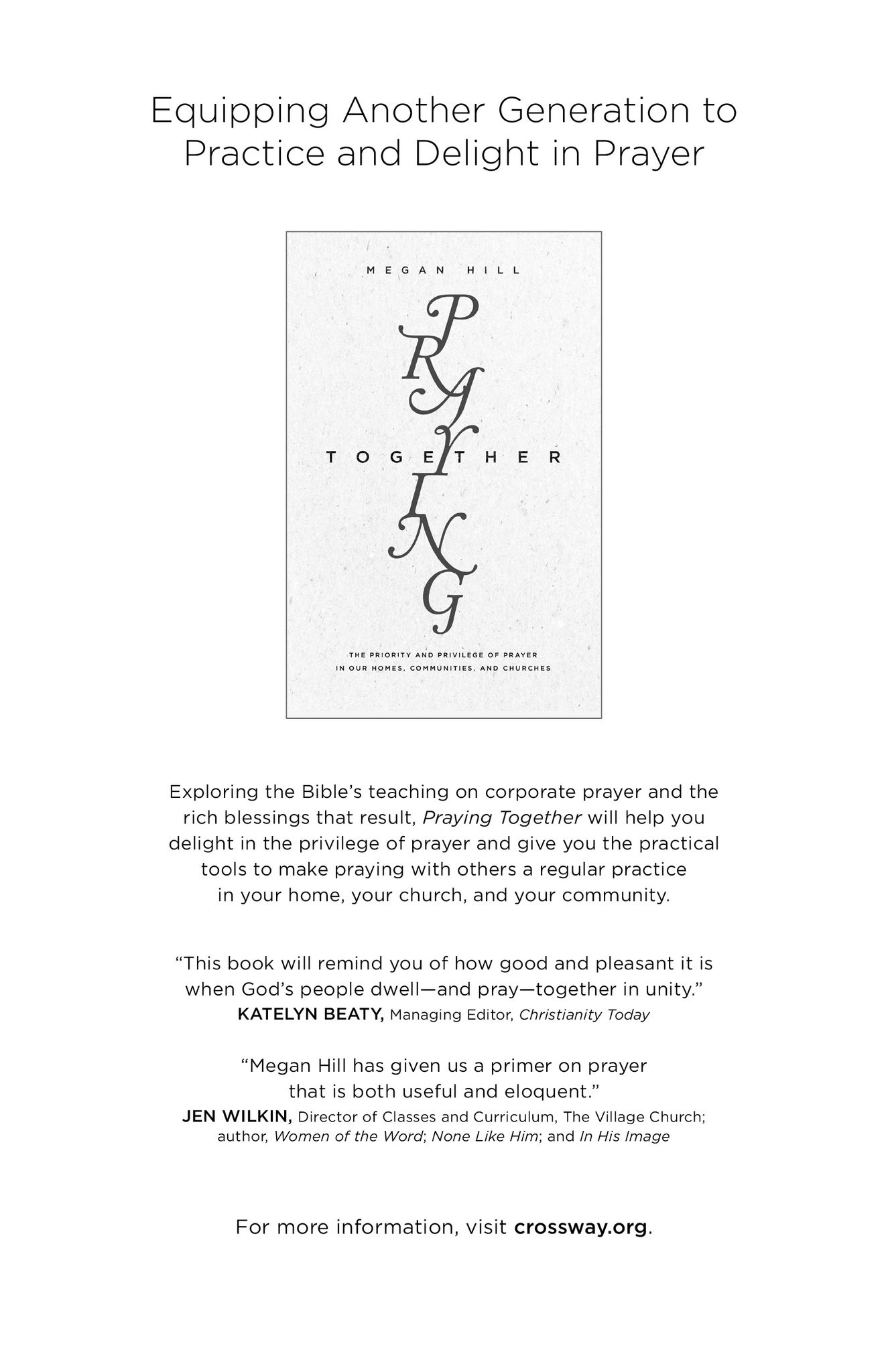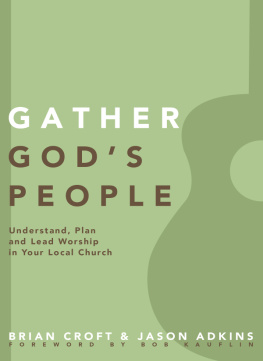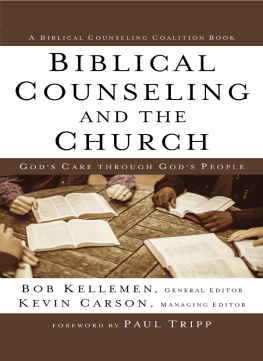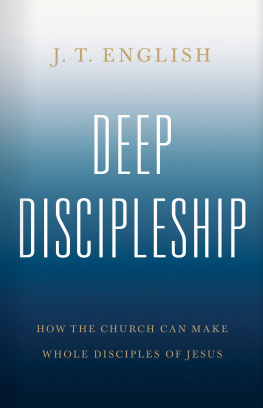Table of Contents
Landmarks

We Have Work to Do
I thank my God in all my remembrance of you... because of your partnership in the gospel from the first day until now.
Philippians 1:3, 5
Summer darkness settles around the church buildingthe bats swoop around its eaves, and the frogs begin their guttural chorus. Inside, most of the rooms are dark too. But down the back hallway a light is on. In one room, seated on chairs arranged in a circle, the church gathers. A handful of peoplea few of them elderly, a few children, a few singles, a few married couplesbow their heads and close their eyes. One by one we take turns leading the others in prayer. We pray for persecuted congregations on the other side of the world; we pray for fledgling churches on the other side of the state; we pray for the success of the gospel in our own community. We bring before the Lord names of specific people who do not yet know him. We ask the Lord to send out workers into his harvest field. We plead for boldness for workers who are already laboring. With one accord, we petition the Father to build his church and glorify his name. We ask him to send his Spirit. And then, in the name of the Son and with a chorus of amens, we are finished. We raise our heads and open our eyes, exchanging a few words with the people around us. We gather our belongings, and we walk out into the night.
Humanly speaking, a church prayer meeting doesnt look like much. A group of people spending an hour with their eyes closed taking turns addressing an unseen God is unlikely to draw the acclaim of the world. At best, it seems like a quaint ritual. At worst, outright foolishness. Our unbelieving friends and neighbors place little value on an uncomfortable, time-consuming, spiritual practice that has no tangible or immediate results. The people of the world dismiss our intercessions with barely a thought. But though they dont know it, the church at prayer is their very best friend. People walking in darkness have no better ally than a group of believers on their knees, united in the work of pleading for the light of Christ to shine in their undying souls.
So far in this book, we have seen many glorious truths about the church. We have heard Gods resounding declaration thatno matter how unimpressive or weak or strugglingthe local church is beloved by him, called to be his people, gathered to worship, given shepherds, granted gifts, made holy, and joined as a family. In the church, we experience all the fullness of Christ. Now we will widen our gaze and consider our work in the world. Go therefore, Christ charged his church, and make disciples of all nations, baptizing them in the name of the Father and of the Son and of the Holy Spirit, teaching them to observe all that I have commanded you (Matt. 28:1920 ).
When the local church engages in the work of living for Gods glory, of praying persistently, and of giving generously, we become partners in the gospel and, ultimately, partakers together of grace. It may not look like much, but its one of the most important jobs in the world.
Fellow Workers
In the last chapter we considered Gods promise to give From the earliest chapters of the Bible, we see that all the nations of the earth have a place in Gods redemptive plan and that God will use his people to bless all peoples.
Although the Old Testament doesnt reveal exactly how this will happen, it is unequivocal in declaring that it will happen. In one passage after another, we read joyful descriptions of what it will look like when the nations are blessed and come to know the Lord as their God. The psalms, in particular, overflow with missionary expectation. They delight in the day when stories of the Lords blessing on Israel will be a compelling invitation to worldwide praise:
Declare his glory among the nations,
his marvelous works among all peoples!...
Ascribe to the L ord , O families of the peoples,
ascribe to the L ord glory and strength!...
bring an offering and come into his courts! (Ps. 96:3, 78)
They wait for the day when all the earth will obediently serve the L ord with gladness (Ps. 100:12). They look for the day when all peoples will bring worship to God alone: All the nations you have made shall come and worship before you, O L ord , and shall glorify your name (Ps. 86:9). The Old Testament repeatedly anticipates a time when all the families of the nations (Ps. 22:27) will together serve and worship the Lord.
These psalms, what one writer calls the music of missions, would have been regularly on the lipsand in the heartsof the Israelites. Its fitting then, that stirred by the vision of what would be, Gods people joined together to ask him to bring it to pass:
On your walls, O Jerusalem,
I have set watchmen;
all the day and all the night
they shall never be silent.
You who put the Lord in remembrance,
take no rest,
and give him no rest
until he establishes Jerusalem
and makes it a praise in the earth. (Isa. 62:67 )
Jerusalem was the place of Gods presence and the center of true worship. By asking God to make it a praise in the earth (Isa. 62:7), the Israelites expressed their longing to see people from all nations bowing before the Lord in worship. And they didnt just pray for this casually or occasionally; they prayed for it all the day and all the night (62:6). The people who knew the Lord wanted others to know him too. They prayed for it in the congregation and in their homes, when they got up and when they went to bed, from their earliest childhood lispings to their deathbed exhalations. On their knees, Gods people took no rest, and they gave God no rest. In light of his glorious promises, they asked him to act.
And he did. Christ came into the world, lived a life of perfect obedience, died for the sins of his people, rose from the tomb, and ascended into heaven. On the cross, he was lifted up so all the earth might worship. Then in his last earthly instructions to his gathered disciples, he gave them the marching orders they had been anticipating for thousands of years: All authority in heaven and on earth has been given to me. Go therefore and make disciples of all nations, baptizing them in the name of the Father and of the Son and of the Holy Spirit, teaching them to observe all that I have commanded you (Matt. 28:1820). On the mountain, the head of the church declared the mission of the church to the members of the church: Go and make disciples.
The Old Testament prophesied a time when people from all nations would gather to worship God and learn to obey him. The Christ-given mission of the New Testament church fulfills it.
Detailing the period following Jesus s ascension, Acts and the Epistles show us in greater detail how the church undertakes its commission. In Acts we see that disciple making and church planting are intrinsically connected. Wherever the apostles went, they preached the gospel and established local churches among those who believed. Beginning in Jerusalem and throughout Asia and even to Rome itself, the gospel advanced by the preaching of Gods appointed messengers. The churches at Ephesus, Philippi, Galatia, Colossae, and Corinthcongregations familiar to any reader of the New Testamentbegan through the missionary efforts of gospel preachers. And those churches, in turn, invested in the planting of gospel seed in their communities and in faraway places. Lest we believe first-century gospel success was the single-handed work of a few men, the Epistles reaffirm that the mission of the church belonged to the entire church. Repeatedly, Paul thanks the churches for their gifts, asks the churches for their prayers, and commends the churches for their faithful gospel witness. Though the preachers may have been out front, they never worked alone; the gathered people of God were their indispensable partners.










